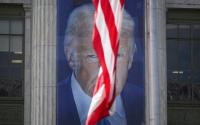9 December 2005The Independent
They came promising to talk and hoping to agree to more talks. And they have talked and talked. And by tonight, if all goes well, they will have secured an agreement requiring them to come back and talk some more.
At the United Nations climate change talks in Montreal it seems the urgent task of tackling global warming is a long and slow process. But officials claim, perhaps as you might expect, that important progress is being made.
The Environment Secretary, Margaret Beckett, who is representing the presidency of the EU, said yesterday that most of the obstacles stopping the Kyoto protocol along have been overcome. She said she had experienced "false euphoria" before, but said the mood at the talks was positive.
That is partly because expectations on entering these negotiations were so low. Officials said they were not expecting to come away with any new targets for cutting emissions of greenhouse gases once the first stage of the Kyoto process ends in seven years, but simply a commitment to continue negotiations about that process post 2012.
Representatives from around the world are at the talks for two separate meetings. The largest is the annual gathering of the 190-odd countries who agreed at the 1992 Earth Summit in Brazil there was a need to tackle climate change. In the bureaucratic shorthand, this meeting is known as the Cop (Conference of Parties).
The second meeting is for 155 nations which recognised that, while important, such an agreed statement was not enough by itself. In 1997, they agreed to the Kyoto protocol demanding cuts in the emission of greenhouse gases. (This is the Mop - the Meeting of the Parties). Of these 155 countries, 36 industrialised nations, including the UK, have agreed to an overall reduction to 5 per cent beneath 1990 levels.
Much of the attention this week has focused on the US, a member of the Cop rather than the Mop, since President George Bush rejected Kyoto in 2001. The Cop is expected to approve a bland agreement to further talks. (Given US opposition to any greater level of commitment, most campaigners place the US in the category of bad cop/Cop).
The US has refused to adopt legally binding targets to cut the emission of greenhouse gases, and has insisted it will not agree to any binding commitments for the post-2012 periods. It has said it will not agree to "negotiations" on such an issue and refuses to agree that it involved in such a "process".
Sometimes, the semantic pedantry it uses to get through these two weeks of talks while avoiding any meaningful commitment becomes farcical.
At a briefing on Wednesday, the senior US official, Paula Dobriansky, the undersecretary of state for global affairs, declared: "We firmly believe negotiations will not reap progress ... We have concerns about formalised discussions that provide a basis for negotiations. We believe progress cannot be made that way."
She said this while maintaining with a straight face that the US - which accounts for 25 per cent of the world's greenhouse gas emissions - was acting as a beacon to the rest of the planet when it came to tackling climate change. "We lead the world in climate change science - $2bn (£1.14bn) this year," she said.
Such an unwillingness to participate has led to criticism from other countries. The Canadian Prime Minister, Paul Martin, said: "To the reluctant countries, including the US, I said this: there is a such a thing as a global conscience and this is the time to listen to it. There is absolutely no excuse for any more delay for action."
The Bush administration claims new technology - rather than legally binding targets - is the way to tackle climate change. To this end it, will be participating early next year in the Asia-Pacific Partnership for Clean Development and Climate. This group includes Australia, China, India, Japan, and South Korea.
The US has indicated it will send its Secretary of State, Condoleezza Rice, to the talks, in contrast to the undersecretary of state sent to this meeting.
Mrs Beckett said reporters should draw their own judgement as to what signal this sent regarding which meeting the US considered to be the most important.
For the Americans, the talks in Australia scheduled for January offer an easier way forward. Aside from the discussions about new technology, it requires no commitment from participants. Except, perhaps, for more talks.






